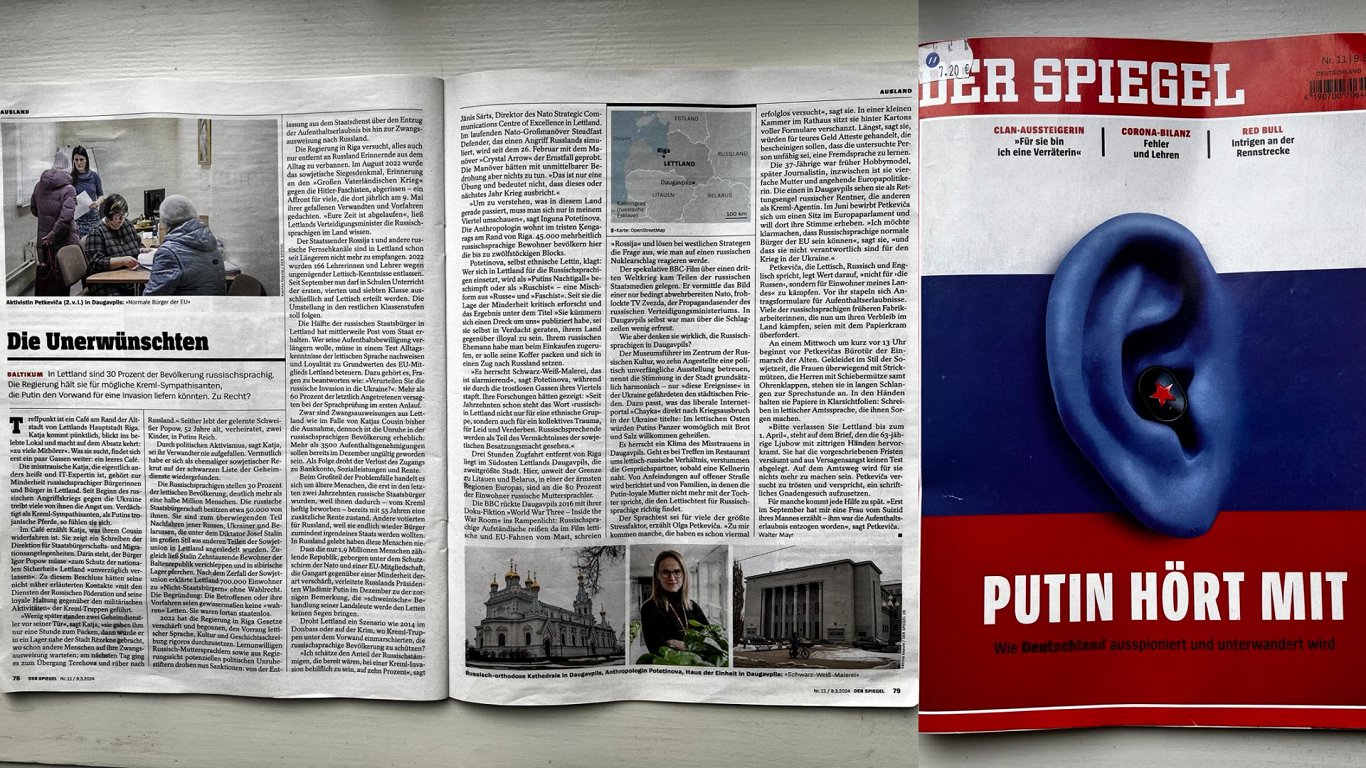The article, has raised the hackles of the MFA for claiming that the Latvian government considers approximately 30% of the population to be a potential bridgehead for the invasion of Russian dictator Vladimir Putin, among other things.
"Around 30 percent of the Latvian population are Russian speakers. The government believes they could provide Vladimir Putin with a bridgehead into the country," it says right at the outset.
The printed version of the story by Walter Mayr was titled 'Die Unerwünschten' (The Unwanted) but online this has been changed to 'Wo Russischsein unerwünscht ist' (Where being Russian is undesirable) and for its English version it was given yet another title: 'Latvia tightens the screws on its Russian minority'. It is available to read online in English.
The head of the Directorate of Citizenship and Migration Affairs (PMLP) Maira Roze said that the article is so biased that it is difficult to talk about it, starting with the fact that the sensational story of the deportation of one "Igor Popov, a citizen of Latvia" – as stated in the article – appears to be completely made up.
"I have no information that there is any deportation camp in Latvia. It is impossible to deport a Latvian citizen from Latvia anyway. This is a completely absurd statement," said the head of the PMLP.
Rihards Bambals, head of the Strategic Communication Department of the Cabinet of Ministers, also assessed that the journalist in question appears to have trouble differentiating between the status of Russian speakers in Latvia (who include many Latvian citizens) and Russian citizens who are, after all, citizens of a third country.
"The author is trying to describe the situation in Latvia in connection with the introduction of amendments to the Immigration Law, which concerns 25,000 people, citizens of the Russian Federation, not Latvian Russians or Russian-speakers," said Bambals.
Russian citizens who do not pass the language tests, but have started the process for the extension of temporary residence permits, are not deported immediately, so there is no deportation without the possibility of appeal, the head of the PMLP emphasized. Deportation could affect around 3,000 people and then only if they do not respond to the statutory demands at all.
"Currently PMLP has issued ten departure orders, three have been carried out," noted Roze.
Citizens of third countries who live in any EU member state and completely ignore communication with the relevant migration authorities could probably expect something similar.
The writer of the Der Spiegel piece did not contact the Latvian migration services to clarify the situation, and the head of the Strategic Communication Department of the Cabinet of Ministers, Bambals, drew attention to the fact that, although sharp criticism was expressed about the presumed position of the Latvian government, the article does not in fact include any official source.
"There are a lot of inaccuracies, a lot of factual errors and sloppiness. We are familiar with this publication. A letter has been prepared together with the Ministry of Foreign Affairs of Latvia," said Bambals.
Mārtiņš Kaprāns, a researcher at the Institute of Philosophy and Sociology of the University of Latvia, also assessed that the article intentionally created an atmosphere of fear by stereotyping the Russian-speaking population, their status and motivations.
Social anthropologist Inguna Potetinov, is quoted in the article as the only academic researcher. She told Latvian Radio that she does not deny her expressed opinion that the voices of Russian speakers are not widely heard in Latvia, but she also said the author of the piece had published erroneous and inconsistent information – and that she had never pretended to be an expert on minority issues.
Latvian Radio attempted to contact Walter Mayr, but his phone was turned off, and the Ministry of Foreign Affairs of Latvia had not yet received a response from the editors of Der Spiegel.




























